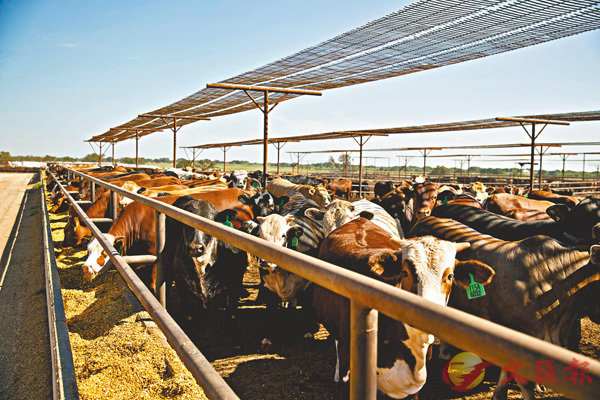 ■製作試管肉不需如傳統畜牧業每年消耗十億噸穀物飼養牲畜,且不會對牲畜帶來痛苦。 資料圖片
■製作試管肉不需如傳統畜牧業每年消耗十億噸穀物飼養牲畜,且不會對牲畜帶來痛苦。 資料圖片【原文】下文摘錄自香港《文匯報》2018年11月18日報道︰
美國農業部(Department of Agriculture)及食品和藥物管理局(Food and Drug Administration)前日宣佈達成協議,將分擔監管人造肉類(cell-cultured meat)生產及推出市場的責任,被視為向「試管肉」未來在美國市場推出亮起綠燈(green light)。試管肉是指通過抽取牲畜的細胞(cell),透過科學細胞方法,跳過生物生長步驟,直接將細胞變成肌肉組織(muscle tissue),進而製成可供食用的肉碎。不過由於現時製作試管肉的成本(production cost)過於昂貴,至今仍未有企業正式推出這類人造肉產品。
製作試管肉不涉及養殖(breeding)或屠宰(slaughter)牲畜,因此過去如何監管、由哪個部門負責監管成為疑問。FDA和農業部上月曾舉行公眾諮詢(public consultation),經研討後決定由雙方分擔責任,而不需另行制定新法例(legislation)。
雙方在聯合聲明中指出,FDA將負責管理企業抽取動物細胞、細胞銀行(cell bank)、培植細胞等事務,而農業部則負責監管人造肉產品。
在試管肉製造過程中,動物細胞只需放在生物反應器(bioreactor)內,再輸送營養(nutrient)及氧氣(oxygen),便可培植成肉,不需如傳統畜牧業每年消耗十億噸穀物飼養牲畜,且不會對牲畜帶來痛苦,因此被視為未來食品,吸引Memphis Meats、Mosa Meat等初創食品公司(start-up)投入市場。不過現時業界面對一大挑戰,是每磅試管肉生產成本高達數萬美元,超越一般消費者的購買力(purchasing power),難以廣泛推出市面。
Memphis Meats行政總裁瓦萊蒂(Uma Valeti)歡迎當局制定監管程序,相信可為業界提供清晰的指引。美國食品研究機構「優質食品協會」(Good Food Institute)政策總監阿爾米(Jessica Almy)則指,以色列(Israel)、日本(Japan)、新加坡(Singapore)等國家均在研究試管肉技術,認為當局規定試管肉監管程序,有助美國試管肉技術維持世界前列。
傳統肉類加工商過去一直要求農業部對試管肉進行監管,美國全國牧民牛肉協會(National Cattlemen's Beef Association)政府事務總監伍德爾(Colin Woodall)稱,協議將給予農業部初步的管轄權(jurisdiction),認為是「向正確的方向踏出一步」,強調當局需保障傳統牛肉的生產商及消費者的權益。
American government announced regulatory policy for production of cell-cultured meat
【譯文】The U.S. Department of Agriculture (USDA) and the Food and Drug Administration (FDA) recently reached a consensus and announced joint regulatory responsibility for the production and marketing of cell-cultured meat, officially giving the green light for the sales of the products in the U.S. market.
Cultured meats are animal flesh products made from extracted animal stem cells instead of slaughtered animals by means of tissue-engineering techniques, directly transforming the cells into muscle tissues and then turning them into edible meats. Yet, no manufacturer has ever tried to commercialize any cell-cultured meat product due to high production costs.
The production of cultured meats does not involve livestock breeding or slaughter, raising the concern of how to regulate and which party should be responsible for overseeing the food products. FDA and USDA, after holding a joint public consultation last month, agreed to share oversight for cell-based meat and no additional legislation would be necessary.
The agreement stated that FDA would oversee cell collection by manufacturers, cell banks and cell growth etc. and USDA would then have supervision over the food products.
In the process of producing cell-based meat, animal cells would grow into something resembling real animal flesh only by transferring them to a bioreactor and providing nutrients and oxygen.
Such food technology saves billions of tons of grain to raise livestock every year with no slaughter involved, and cell-based meat is therefore regarded as a new alternative-meat to meet future demand, attracting start-ups such as Memphis Meats and Mosa Meat to work on such food products.
However, the industry is facing a huge challenge that the production cost for a pound of cell-based meat is as high as tens of thousands of dollars, which far exceeds the purchasing power of ordinary consumers. Thus, it is not easy to launch the products in the market.
The CEO of Memphis Meats Dr. Uma Valeti welcomed the new regulatory policy and believed it could provide clearer guidance to the industry.
Jessica Almy, the director of policy of the U.S. food research institute the "Good Food Institute", said creating a transparent regulatory path could help the U.S. keep pace with advances in Israel, Japan, and Singapore which had also been working on such food technology.
Traditional meat manufacturers have been requesting USDA to develop and implement appropriate regulatory framework for cultured-meats. Colin Woodall, senior vice president of government affairs at the National Cattlemen's Beef Association (NCBA), said it was "a step in the right direction" that USDA would now have primary jurisdiction over the food products, emphasizing it would be crucial to ensure that real beef producers and consumers were protected and treated fairly.■龐嘉儀
知多點
1. 試管肉是由哪位科學家研製而成?
2. 其中一個研製試管肉的目的是什麼?
3. 據聯合國糧農組織(Food and Agriculture Organization of the United Nations)統計,畜牧業佔世界耕地面積約多少百分比?
4. 牧畜、禽類排出的溫室氣體佔全世界總量約多少百分比?
Answer
1. 荷蘭藥理學家(pharmacologist) Mark Post
2. 解決全球糧食危機(global food crisis)問題
3. 70%
4. 18%

